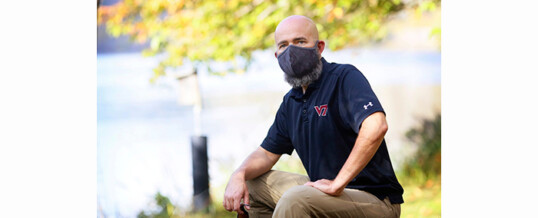
From VT News | December 11, 2020
William Hopkins, professor of wildlife in the College of Natural Resources and Environment, has been selected to receive a 2021 Outstanding Faculty Award from the State Council of Higher Education for Virginia (SCHEV) and Dominion Energy.
The award, which recognizes commitment to excellence in teaching, research, knowledge integration, and public service, is the highest honor awarded to faculty at Virginia colleges and universities.
Hopkins was named associate executive director of Virginia Tech’s Fralin Life Sciences Institute earlier this year. In this role, he will help develop and implement the vision and strategic directions for the institute to tackle grand life science challenges at the interface of the environment and the human condition. He is also the founding director of the institute’s Global Change Center and director of the Interfaces of Global Change interdisciplinary Ph.D. program.
A faculty member in the Department of Fish and Wildlife Conservation, Hopkins researches the ways that wildlife responds to climate change, habitat loss, and other global threats. He directs the Wildlife Ecotoxicology and Physiological Ecology Laboratory and is spearheading research about how human impacts to the environment influence the physiological processes and behaviors of wildlife.
“It is really satisfying to have Dr. Hopkins’ passion, dedication, commitment, and accomplishments be recognized by the SCHEV,” said Paul Winistorfer, dean of the College of Natural Resources and Environment. “His accomplishments in the study of wildlife response to anthropogenic disturbances are significant, and his ability to bring a diverse group of faculty stakeholders together is remarkable.”
Hopkins’ research on avian biology motivated him to take a leading role in the construction of the college’s Research Aviary, located on the western edge of Virginia Tech’s campus. He received the Mitchell A. Byrd Award for outstanding scientific achievement in ornithology from the Virginia Society of Ornithology in 2018. He has also led research on land use impacts on hellbender salamanders and toxicological risks affecting freshwater turtles.
As an educator, Hopkins has taught courses on Vertebrate Physiological Ecology, Wildlife Biology, Tropical Ecology, and Conservation in the Galápagos, as well as a Global Change Seminar and the Global Change Capstone course.
“Dr. Hopkins has been a leader in the department and across the campus,” said Joel Snodgrass, head of the Department of Fish and Wildlife Conservation, “and his dedication to student success at both the undergraduate and graduate levels is almost super-human. His work to engage undergraduate students in meaningful research is innovative and highly effective, and his graduate students go on to very successful careers.”
Hopkins has published nearly 200 peer-reviewed papers and chapters on a broad range of wildlife conservation topics. He has received numerous awards for his teaching and mentorship work and has worked collaboratively with state and national agencies, stakeholders, and rural communities to aid in preserving and protecting natural environments and resources.
He has served on four National Academies of Sciences, Engineering, and Medicine committees, and his expertise has been sought in the aftermath of significant environmental disasters, including the Tennessee Valley Authority ash spill, the BP oil spill in the Gulf of Mexico, and the Tisza River cyanide spill in Hungary. His research has been featured by NPR, the BBC, “60 Minutes,” The New York Times, and elsewhere.
Hopkins is one of 12 professors across the commonwealth to be honored by the SCHEV and Dominion Energy this year. Award nominees are reviewed by a panel of peers and chosen by a committee of leaders from both the public and private sectors. Hopkins joins an elite group of three dozen Virginia Tech faculty members who have previously received this award.
“To receive this recognition from the commonwealth is a tremendous honor,” Hopkins said, “but it is only possible because I am lucky enough to be part of an amazing collaborative community. I feel so fortunate to be at a world-class institution, surrounded by innovative colleagues and stellar students, doing what I love most.”
— Written by David Fleming
Related stories
- William Hopkins named associate executive director of the Fralin Life Sciences Institute
- Professor appointed chair for National Academies of Sciences, Engineering, and Medicine committee
- William Hopkins receives Mitchell A. Byrd Award for outstanding achievement in ornithology
CONTACT:
Krista Timney
(540) 231-6157
DEC
2020
